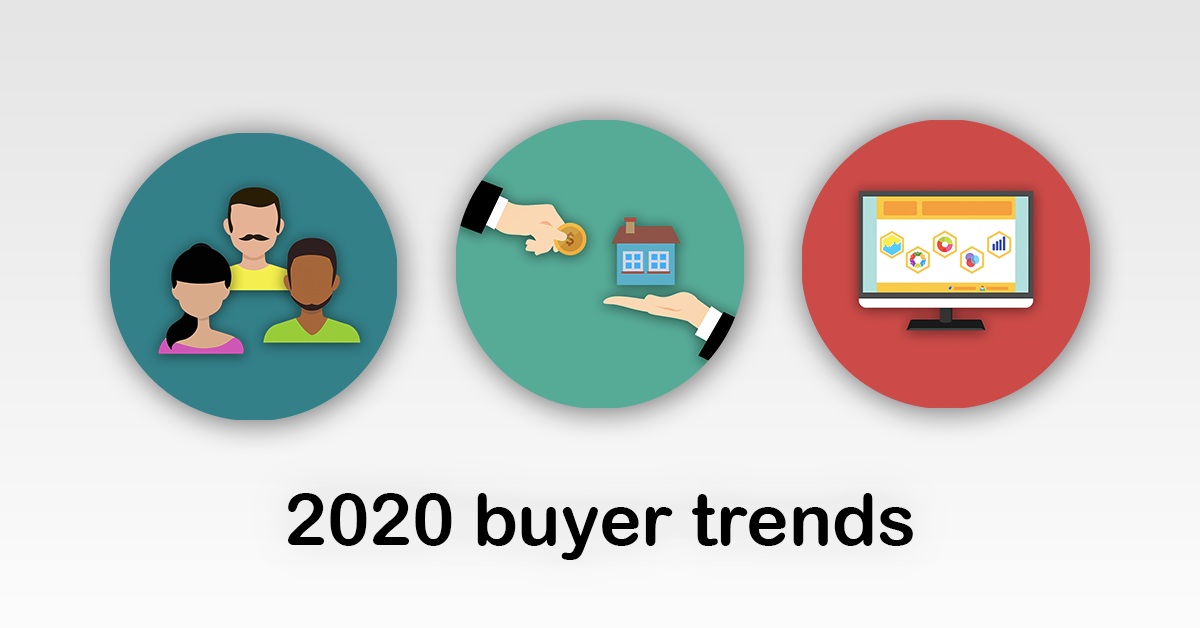Another year has come and gone, and with a new year comes new goals. Whether you've decided this is the year you're going to sell your home or if you're considering it, you need to know which buyer trends to expect in 2020. We've laid out the most important trends for this year and how it could affect your decision as a seller.
Trend #1: Millennials are still on the move

Millennials are anyone born between the years 1981 and 1997, and the majority of them will be turning 30 in 2020. This year, older millennials will be starting to think about settling down, having kids, and buying their first home. By the time we're halfway through 2020, millennials will account for more than half of all mortgages taken out in the US, which is higher than all other generations combined.
With millennials looking to buy this year, most older generations, such as the baby boomers and Generation X, aren’t going to be making moves anytime soon. Most may still be raising kids or not ready to retire yet, which means they are staying put. So for 2020, it's all about millennial homebuyers.
What this means for sellers:
- If you’re considering making upgrades to your home before you sell, know what millennials want. The features at the top of their lists include a patio, hardwood front exterior, a laundry room, and a walk-in pantry.
- Millennials are less concerned with how big a home is and more concerned with how far it is from work and the school district. According to NAR, most millennials are less willing to compromise on the quality of the neighborhood and schools when buying a home.
- Almost all millennials search online when looking for a home, and 80% of them found their home on their phone. Be sure that your online listing photos are high quality, and your listing is visible on the major consumer search websites.
Trend #2: Prices & iBuyer's are on the rise

In 2018, home prices rose by 5%; in 2019, they rose by 3.3%, and in 2020 they are predicted to increase by 2.8% according to The Economic & Housing Research Group. Even though that’s not a whole lot, it’s still a steady increase each year.
The iBuyer trend is predicted to increase this year. An iBuyer is a real estate company that makes an offer on a home within days. According to REAL Trends, Zillow is planning to expand in 6 new markets with their iBuyer business, Zillow Offers.
What this means for sellers:
- With home prices still on the rise, you may make a profit on your home if you sell this year. It's also vital to keep in mind that some buyers may be priced out of the market, which potentially means fewer offers. Make your home stand out, and if you’re not in a hurry to sell, don’t be afraid to wait for the right offer.
- Although "location, location, location" has been the slogan for the past few years, it seems that buyers (especially since millennials are now the largest group of homebuyers) are willing to comprise location for a more affordable option.
- With iBuyer companies on the rise, it's essential to know who's on the playing field. iBuyers basically take the human experience out of selling your home, and you're likely to get a not-so-good offer. If you're not in an absolute rush, don't take the easy way out.
Trend #3: Mortgage interest rates are on the decline

Interest rates for mortgages were dropping below 4% for some loans in 2019. Some say that for 2020, a 30-year loan should have a rate of 3.7%, and a 15-year mortgage will be at 3.2%. Just like anything in life, this isn’t a guarantee. Trade wars and tariffs could shift the economy, causing an increase in interest rates to balance out the economy. But if mortgage rates do stay on the decline, this could be a motivation for more buyers.
What this means for sellers:
- Lower interest rates mean buyers will be more motivated to buy sooner rather than later. A mortgage is a substantial financial commitment, so if someone has been thinking about buying and sees lower interest rates, this may push them to commit.
- Nothing in life is certain, so if rates do increase, be prepared for your home to be on the market longer than you expected.
Curious about whatyour home is worth now?
Get an accurate home value report from us.
-1.png)
-1.png)




